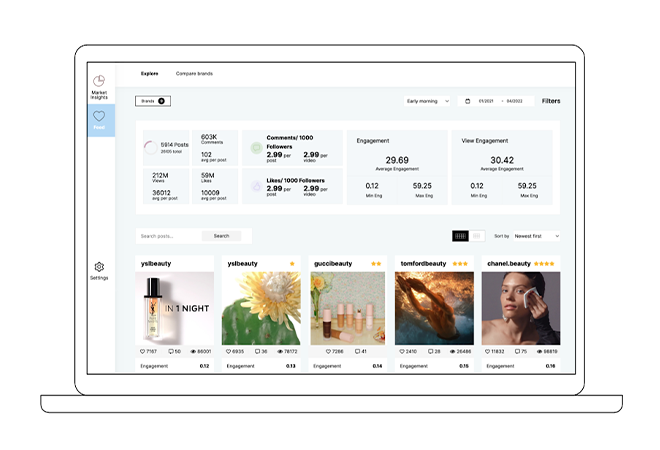Climate change is rapidly altering how we live, with 88% of global consumers considering sustainability when shopping. As the world moves towards a more science- and technology-driven economy, social media and artificial intelligence are becoming an increasingly popular choice in the battle against issues such as global warming. To better understand how beauty brands respond to sustainability issues, Eyecue Insights, an AI-powered social media analytics platform, has published the Social Media Sustainability Playbook, a comprehensive compilation of data that analyzes how beauty brands engage with environmental awareness.
Eyecue Insight’s AI platform turned visual content on social media into data, sourcing the key information needed to optimize a business's performance. The Social Media Sustainability Playbook outlines findings from 160,000 Instagram posts presented by 130 beauty brands and retailers from January-August 2022, examining data and suggesting ways brands can correctly move towards a more sustainable future. The report found that despite a 47% increase in the mention of sustainability across the analyzed accounts from 2021-2022, only 5% of overall brand content addressed sustainability, suggesting there is still a long way to go. According to Eyecue Insights, the increase in brands' coverage of sustainability has come hand in hand with consumer demands for sustainability within products and services across all retail categories.
“Sustainability is an issue that applies to all industries, but especially beauty,” says Eyecue Insights founder Carolina Bañales. “Given the nature of the beauty industry and the amount of waste it generates and the size of its audience, brands in this space carry an obligation to not only ensure they are taking the measures to be more sustainable, but also to educate consumers on their sustainability efforts.” Bañales emphasizes the importance of shared responsibility between brands and consumers in creating meaningful sustainability. “Our data shows a critical breakdown in communication between brands and consumers when it comes to this topic—and it is to address this that we’ve created the playbook,” she remarks.
Across all accounts analyzed, one out of 20 posts are related to sustainability, 53% mention a product's benefit, 48% mention product type, and 35% mention product ingredients. This information indicates that brands are still putting a greater emphasis on the product itself rather than its environmental impact. The report also implies that sustainable storytelling is benefitting several brands' growth, with sustainable content share doubling from 5% to 10% in the lead-up to events such as Earth Day—although it can also cause distrust among consumers who could see the content as performative environmentalism.
Bañales suggests that many beauty consumers look to brands that will educate them and help to challenge “greenwashing,” the harmful sharing of false sustainability claims in the hope of increasing sales and seeming aligned with the current rise in concern for the environment.
“We see higher engagement with sustainability content that mentions several aspects of sustainability and goes into detail explaining initiatives and their impact,” Bañales tells BeautyMatter. “This is aligned with the ‘skintellectual’ trend among beauty consumers, who look to be educated by brands and challenge unfounded claims. What should beauty brands do to avoid their efforts being perceived as greenwashing? Be consistent, transparent, and precise.”
Typically, across the accounts analyzed, sustainability-led brands generated a 60% higher engagement across all content in comparison to their non-sustainability-related counterparts. Consumers are more likely to accuse brands of greenwashing if their sustainability content is infrequent or generic.
With sustainably-led brands increasing their audiences, environmental concern has become more mainstream. Crossovers of customers from popular traditional beauty brands to more niche sustainability-led brands is also increasing. Sustainably conscious brands are seeing a 72% increase in shared audience with smaller niche brands, 37% with retailers, 34% with prestige brands, and 32% with science-led brands. Brands with four times more content relating to sustainability, mentioning two or more sustainability related topics in 44% of their content, saw a 60% higher engagement rate.
Of the 160 companies assessed, 21, including La Roche-Posay, Fenty Skin, and Credo Beauty, were highlighted as successful sustainability adopters based upon their high sharing of information and their engagement levels. Out of the top 21 accounts that excel in sustainability content, 57% fall into the sustainability-led group. 76% of the companies are independently owned, while 24% are group owned. The top five topics of conversation from these brands were general sustainability, refillable packaging, recyclable packaging, reusable packaging, and waste.


“At one end, 64% of brands talked about sustainability in 7% of their content, while 36% of brands only did so in 1% (or under) of their content. Brands that are able to mention more than one topic per post as well as create a higher share of content are more likely to be drawing from comprehensive sustainability efforts, giving consumers confidence,” Bañales states.
Eyecue Insights’ Playbook also proposes that content that includes celebrity endorsements tends to gain much higher traction than content without, encouraging consumers to be more involved with environmental concern after seeing their idols tap into the topic. Sustainability-based content also saw 41% more text across posts, as well as higher use of app offerings, such as 22% more content produced using reels, and 44% more content using Instagram’s carousel feature than regular posts.
The report states that 71% of established sustainable brands combine three or more of the following strategies: discussion of sustainability, informing and educating consumers, using the correct content formats, and amplifying messages through celebrity endorsements. For brands to correctly benefit from sustainable discussions, Eyecue Insights suggests featuring environmental impact education in over 12% of content, using at least 18% carousel-based content, 12% text, and 11% reels, as well as pushing for celebrity collaborations.
“Sustainability in the beauty industry needs to be treated as more than an Earth Day trend, rather as a consistently communicated core tenet of brands. At Eyecue, we’re proud to be able to help the beauty industry stay true to its sustainability ambitions. Our mission is to transform how brands interact with data, so we’ll continue to keep the finger on the pulse of the industry and uncover actionable and relevant insights both for brands and the general public, whether it’s representation, sustainability, or beyond,” concludes Bañales.
Ultimately, with an increase in urgency to address environmental issues from both brands and consumers alike, it is imperative that companies make ethical decisions and only share sustainability-based content for the correct reasons, avoiding greenwashing at all costs. With social media usage rising by the day, younger generations will pave the way for a more ethical future by educating each other across apps such as Instagram. Although there is a long way to go, the work of Eyecue Insights and companies alike are encouraging the move to a more sustainable beauty industry. Eventually, the majority of consumers will become knowledgeable enough to call out unethical practices themselves, leaving brands who refuse to adapt to a more sustainable future falling behind.